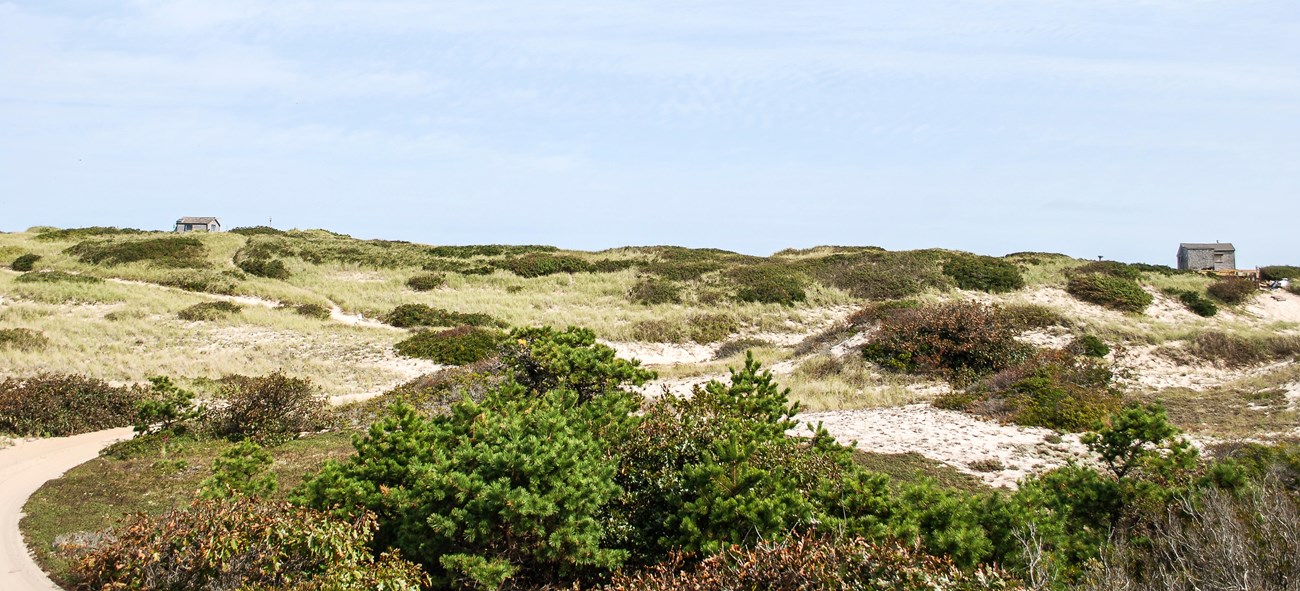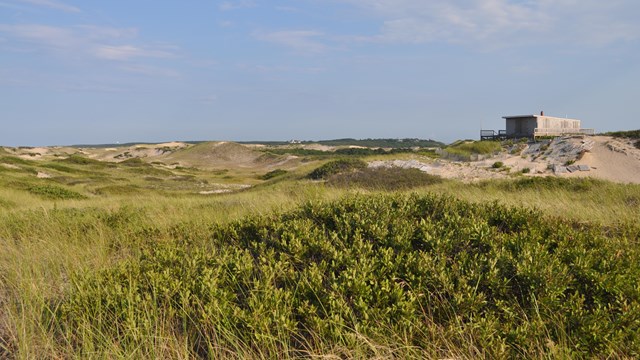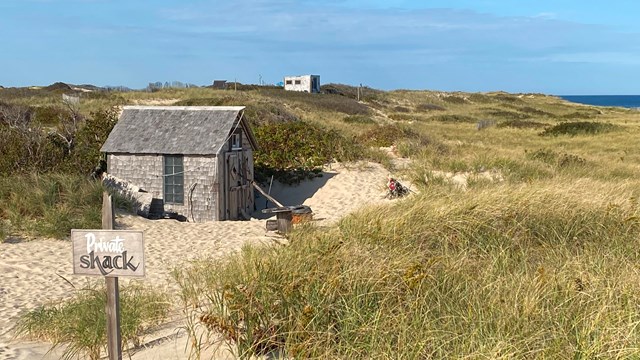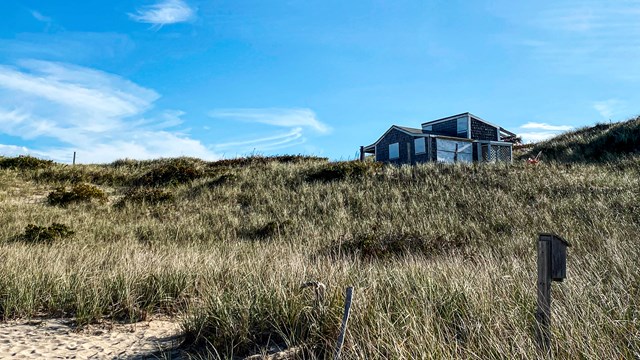
NPS/French The Dune Shacks of Peaked Hill Bars Historic District occupies approximately 1,960 acres within Cape Cod National Seashore at the northern end of the park. The historic district includes both historic buildings, known as dune shacks, and the dune landscape. According to the 2011 National Register of Historic Places documentation, the historic district is significant for its role in the development of American art, literature and recreation; for its association with the life of American poet, Harry Kemp; for its collection of dune shacks which represent a regional waterfront expression of a rare and fragile architectural type of shelters; and for its potential to yield further archeological information about prehistory or history. Eighteen of the 19 dune shacks within the historic district are owned by the National Park Service and are currently occupied by different groups and individuals and used for a variety of purposes. The dune shacks are small, weathered, and often built on pilings to adjust for the ever-moving sand dunes surrounding these properties. The houses are remote, with no paved roads leading to them. Access is required by foot or by 4x4 vehicle along the park’s Oversand corridor. There is limited running water, plumbing, and electrical fixtures in most of the shacks. Most shacks are operated seasonally. The shacks themselves have their roots in the lifesaving huts of the maritime era in the mid-19th century. The first lifesaving station in the area was built in 1872 and was known as the Peaked Hill Bars Lifesaving Station. In 1914, the first recorded transition from a lifesaving structure to a private residence took place. The 1920s through the 1950s saw the construction of the shacks that exist today, and of several that no longer exist. In 1961, when Cape Cod National Seashore was created, dune dwellers continued to live in the shacks. In 1989, the district was found eligible for the National Register of Historic Places because of efforts by long-term dune dwellers, long-term dune shack users, and other advocates, some of whom formed non-profit groups to support dune shack use, as well as the Town of Provincetown and the Massachusetts Historical Commission. In the 1990s, a few locally based non-profit organizations began to offer programs and maintain some shacks in the district. In 2009, the National Park Service obtained funds to initiate an Environmental Assessment (EA) for developing a long-term management plan for the district, to conduct several studies, and to reestablish a Dune Shack Subcommittee of the Advisory Commission, which convened in November 2009. Following several years of significant input from all stakeholders and guided by the findings of the Dune Shack Subcommittee, the park completed the Dune Shack Preservation and Use Plan in 2012. The plan established the roadmap for how the buildings and the adjacent landscape would be protected and interpreted and how residents and visitors would use the district in the future, consistent with the qualities for which the district was determined eligible for the National Register of Historic Places. Emphasis was placed on preserving the contemplative solitude of the district, supporting the long-term relationships in the district, minimizing interference with natural dune processes, providing educational opportunities for the public and partners and establishing preservation maintenance processes. In May 2023, the park announced the Request for Proposals for leasing of eight dune shacks, including the Jones Shack, the Kemp Shack, the Fleurant Shack, the Adams Shack and Guest Shack, the Fearing-Bessay Shack, the Braaten Shack and the Watson Shack. The Request for Proposal period ended July 1, 2023. 
NPS Graphic/Rasmussen Residency Programs - Dune Shacks of the Peaked Hill Bars Historic DistrictSeven of the eighteen National Park Service-owned dune shacks are managed by park partners to host artist-in-residence lotteries and educational programs (Cohen Shack, Euphoria Shack, Malkin Shack, Margo-Gelb Shack, Fowler Shack, Thalassa Shack, and Wells Shack). Click the links below for more information on each program. 
OCARC Art Residency
The Outer Cape Artists in Residence Consortium is a residency program offers artists two-week dune shack residencies. 
PHT Arts and Science Residency Program
Residencies in PHT’s Arts and Sciences Program consist of one to two week stays in the dune shacks of Cape Cod National Seashore. 
Provincetown Community Compact Residency
Provincetown Community Compact is a community-building and philanthropic organization to support artists and the vitality of the community. |
Last updated: January 16, 2025
